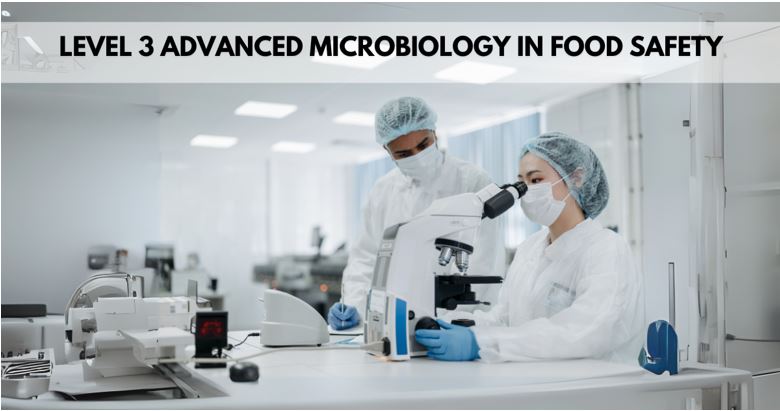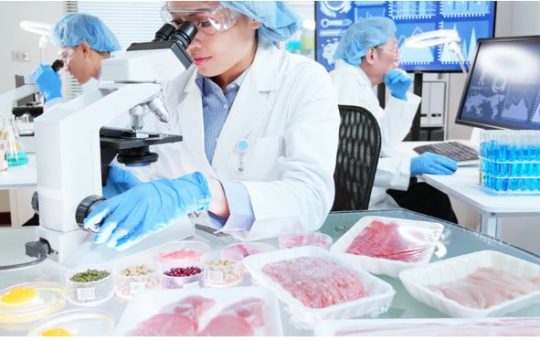
Level 3 Advanced Microbiology in Food Safety
Course Overview:
The Level 3 Advanced Microbiology in Food Safety course is designed for individuals working in food production, food safety, and quality control. This course explores the role of microorganisms in food safety, providing advanced knowledge of how microorganisms affect food safety, spoilage, and public health. Participants will learn about the types of microorganisms commonly found in food, their impact on foodborne illnesses, and how to manage microbial risks to ensure food safety. This course is ideal for food safety managers, quality assurance professionals, and anyone looking to enhance their understanding of microbiological safety in the food industry.
Benefits:
- In-depth Microbial Knowledge: Gain advanced knowledge of foodborne pathogens, spoilage organisms, and how they affect food quality and safety.
- Food Safety Expertise: Understand the connection between microbiology and food safety to improve food safety practices and minimize contamination risks.
- Regulatory Compliance: Learn about the microbiological standards and regulations required to ensure compliance with food safety laws.
- Career Growth: Enhance your career opportunities by deepening your expertise in food microbiology, making you a key asset in food safety roles.
Learning Outcomes:
Upon successful completion of this course, you will be able to:
- Identify and understand the key microorganisms involved in foodborne illnesses and food spoilage.
- Analyze the factors that promote microbial growth in food and how to control them.
- Apply microbiological testing and monitoring techniques to assess food safety.
- Implement strategies to prevent, reduce, and control microbial hazards in food production and processing environments.
- Understand and interpret food safety regulations, microbiological standards, and their impact on food safety systems.
- Develop and manage effective food safety plans that address microbiological hazards.
Study Units:
- Introduction to Food Microbiology
- Overview of microbiology and its relevance to food safety.
- Classification of microorganisms in food: bacteria, viruses, molds, yeasts, and parasites.
- Foodborne Pathogens and Their Impact
- Study of major foodborne pathogens, including Salmonella, E. coli, Listeria, and others.
- The role of pathogens in foodborne diseases, their symptoms, and control measures.
- Microbial Growth and Environmental Factors
- Factors influencing microbial growth, such as temperature, pH, water activity, and oxygen levels.
- How to control microbial growth through temperature control, packaging, and preservation methods.
- Microbiological Testing and Quality Control
- Techniques for sampling and testing food for microbiological contamination.
- Understanding microbiological standards and limits for food safety.
- Preventing Microbial Contamination in Food
- Best practices for preventing contamination during food production, processing, and handling.
- The role of hygiene, sanitation, and personal protective equipment in controlling microbial risks.
- HACCP and Microbiology
- Integrating microbiology with HACCP principles to prevent and control microbial hazards.
- How to incorporate microbiological considerations into your HACCP plan.
- Regulations and Standards in Food Microbiology
- Study of food safety regulations and microbiological standards set by organizations such as the FDA, EFSA, and WHO.
- How to comply with microbiological regulations in food production.
- Emerging Microbial Risks and Trends
- New and emerging microorganisms that may pose food safety risks.
- The impact of modern food production and global food distribution on microbial safety.
Career Progression:
Upon completing the Level 3 Advanced Microbiology in Food Safety course, you will be prepared for various roles in the food safety and microbiology field, including:
- Food Safety Manager: Manage food safety programs, conduct microbiological testing, and implement measures to prevent foodborne illnesses.
- Quality Control Analyst: Oversee the quality and safety of food products through microbiological testing and audits.
- Microbiologist in Food Production: Apply microbiological expertise to monitor and control microbial risks in food manufacturing and processing environments.
- HACCP Specialist: Develop, implement, and monitor HACCP plans with a strong focus on microbial safety.
- Food Safety Consultant: Provide consultancy services to food businesses, advising on microbiological risk assessment and control strategies.
- Regulatory Compliance Officer: Ensure food products comply with microbiological standards and regulations, conducting inspections and audits.
Our assessment process is designed to ensure every learner achieves the required level of knowledge, skills, and understanding outlined in each course unit.
Purpose of Assessment
Assessment helps measure how well a learner has met the learning outcomes. It ensures consistency, quality, and fairness across all learners.
What Learners Need to Do
Learners must provide clear evidence that shows they have met all the learning outcomes and assessment criteria for each unit. This evidence can take different forms depending on the course and type of learning.
Types of Acceptable Evidence
Assignments, reports, or projects
Worksheets or written tasks
Portfolios of practical work
Answers to oral or written questions
Test or exam papers
Understanding the Structure
Learning outcomes explain what learners should know, understand, or be able to do.
Assessment criteria set the standard learners must meet to achieve each learning outcome.
Assessment Guidelines
All assessment must be authentic, current, and relevant to the unit.
Evidence must match each assessment criterion clearly.
Plagiarism or copied work is not accepted.
All learners must complete assessments within the given timelines.
Where applicable, assessments may be reviewed or verified by internal or external quality assurers.
Full learning outcomes and assessment criteria for each qualification are available from page 8 of the course handbook.
Top Courses
No results found.
Related Courses
Let's Get in touch
Deleting Course Review
Course Access
This course is password protected. To access it please enter your password below:



